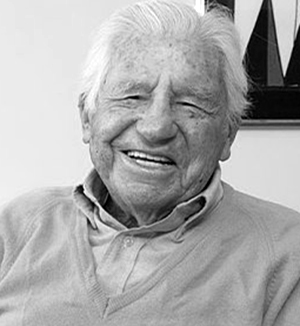
Meyer Howard "Mike" Abrams (July 23, 1912 – April 21, 2015), usually cited as M.H. Abrams, was an American literary critic, known for works on romanticism, in particular his book The Mirror and the Lamp. Under Abrams' editorship, the Norton Anthology of English Literature became the standard text for undergraduate survey courses across the U.S. and a major trendsetter in literary canon formation. (Click here for full Wikipedia article)
-----
All students are capable of growth. Some of them seem to be very slow to begin with and it's probably not their fault, nor do I think it's a matter of genetics. It's a matter of what has happened in their lives before. They are all capable of growing, but they will not grow unless you interest them, captivate them in some way, and then make them reach out. Then they will finally enjoy reaching out.
Hard work makes easy reading or, at least, easier reading.
I think most of the things I published have been published out of desperation, not because they were perfected.
I think the hardest thing to teach a student is that what he or she puts down on paper is changeable. It's not the final thing, it's the first thing, which may just be the suggestive, vague identification of something that you have to come back to and rewrite. At first, students tend to freeze at the first effort. The breakthrough comes when they realize that they can make it better — can identify what their purposes were and realize better ways to achieve those purposes. That is the important thing in teaching students to write: not to be frozen in their first effort.
If you learn one thing from having lived through decades of changing views, it is that all predictions are necessarily false.
If you read quickly to get through a poem to what it means, you have missed the body of the poem.
It's a pleasure that you don't outgrow the anthology.
It's amazing how, age after age, in country after country, and in all languages, Shakespeare emerges as incomparable.
Key metaphors help determine what and how we perceive and how we think about our perceptions.
Life without literature is a life reduced to penury. It expands you in every way. It illuminates what you're doing. It shows you possibilities you haven't thought of. It enables you to live the lives of other people than yourself. It broadens you, it makes you more human. It makes life enjoyable.
One of the joys of teaching with the anthology is to watch the excitement grow as students, who may think the past dull and irrelevant, find how fresh and new and powerful are the kinds of writings that are hundreds of years old.
We are human, and nothing is more interesting to us than humanity.
We are human, and nothing is more interesting to us than humanity. The appeal of literature is that it is so thoroughly a human thing — by, for and about human beings. If you lose that focus, you obviate the source of the power and permanence of literature.
When something startlingly new comes up, young people, especially, seize it. You can't complain about that.
-----
(July 23 is also the birthday of Anthony Kennedy and Raymond Chandler.)
Categories: M.H. Abrams, Quotes of the day
KGB Stuff Commentwear E-Mail KGB
Donate via PayPal

















